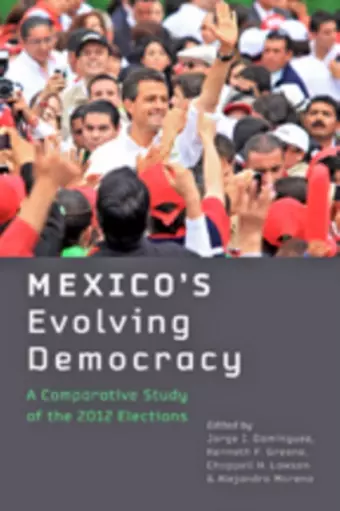Mexico's Evolving Democracy
A Comparative Study of the 2012 Elections
Jorge I Domínguez editor Alejandro Moreno editor Kenneth F Greene editor Chappell H Lawson editor
Format:Hardback
Publisher:Johns Hopkins University Press
Published:20th Feb '15
Currently unavailable, and unfortunately no date known when it will be back

This book is a unique instance of continuity in the academic examination of a topic of significant scholarly and public interest. No other Latin American country has been the subject of such a carefully conducted, methodologically consistent, long-term study of electoral behavior. Attention to such factors as the impact of violence and clientelism on Mexican voters' decisions in 2012 will make this volume of broad interest to advanced undergraduate and graduate students. However, it is this continuity over time that will make the book invaluable to professionals studying Mexican politics in particular and cross-national electoral behavior more generally. -- Kevin J. Middlebrook, University College London, author of The Paradox of Revolution: Labor, the State, and Authoritarianism in Mexico and editor of Conservative Parties, the Right, and Democracy in Latin America Jorge Dominguez and his coeditors, all of them renowned scholars of Mexican electoral politics, brought together a first-rate group of investigators to analyze the 2012 elections from various angles. The end result is a volume broad in scope, rich in detail, and rigorous in methods and theory that helps to explain not only electoral outcomes but also the broader social and political phenomena that were part and parcel of the 2012 Mexican elections. The book is a structured and sophisticated conversation about the main changes and continuities, as well as the challenges and opportunities, that elections present to the country of Mexico. A scholarly tapestry. -- Francisco E. Gonzalez, Paul H. Nitze School of Advanced International Studies, Johns Hopkins University, author of Creative Destruction? Economic Crises and Democracy in Latin America
Parts one and two offer an excellent recap of the "state of play" in 2012; part three analyzes why Mexicans voted as they did; and part four considers the election's implications for Mexico's political system more broadly.In 2012, the Institutional Revolutionary Party (PRI) - which had governed Mexico with an iron grip for 71 years before being ousted in 2000 - was surprisingly returned to power. In Mexico's Evolving Democracy, a team of distinguished political scientists delivers an exceptional analysis of the remarkable 2012 Mexican elections. Extending the scholarship that the editors generated in their panel studies of the 2000 and 2006 elections, the book assesses all three elections from both traditional and nontraditional vantage points, seeking fuller answers to the lingering question of why this maturing democracy returned the party associated with Mexico's old regime to office. To evaluate the PRI's rehabilitation and eventual electoral success, the authors explore Mexico's electoral institutions, parties, candidates, campaign strategies, public opinion surveys, and media coverage. They also delve into issues of clientelism, corruption, drugs, violence, and the rise of new protest movements in the run-up to and aftermath of the elections. Not only does the book provide rich detail for Latin American electoral and democratization scholars, but its coherent narrative will also appeal to those unfamiliar with Mexican politics. Parts one and two offer an excellent recap of the "state of play" in 2012; part three analyzes why Mexicans voted as they did; and part four considers the election's implications for Mexico's political system more broadly.
... outstanding analyses... American Political Science Association impressive contributions by outstanding Mexicanists Party Politics
ISBN: 9781421415543
Dimensions: 229mm x 152mm x 26mm
Weight: 590g
304 pages